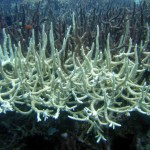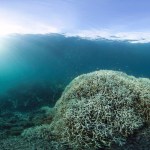Great Barrier Reef
Here's a video from the Guardian on the current status of the reef:
This is going to take a while. If there is a major bleaching event every year for a few years, the reef could essentially die off right away, but most likely, there will still be a few years where coral can spread, and a few years that are not too bad. So one must adjust expectations.
Let me put this a different, perhaps cynical but probably realistic, view. In about four years from now, there will be some bone-headed global warming denier standing on a boat off shore in Australia, showing us a section of really nice, well…
Corals are ocean-dwelling invertebrates in the same phylum as jellyfish. Corals are tiny and create an exoskeleton that is fixed to something hard, like the remains of previously existing corals. So these organisms build up a geological stratum, a reef, beneath the surface of the sea, often close enough that parts of the reef are exposed at the lowest water level. The coral reef system is the substrate for one of the Earth's major ecological zones.
Corals are symbiotic with a single celled dinoflagellate, a kind of algae that combines available nutrients such as ammonia and the…
As well as Monckton Media Watch also looked at the way Jamie Walker passed off his opinioin piece about the Great Barrier Reef as a straight news story. John Bruno dissects Walker's response.
It's not a good time for corals. Last year, a third of coral species went straight into the endangered lists after being assessed for the first time, and it looks like 2009 isn't going to bring any reprieves to the doom and gloom. In particular, a new study provides hard evidence that the mightiest of coral super-colonies - the Great Barrier Reef - is in trouble.
Like reefs across the world, the Great Barrier Reef faces many threats, including pollution, physical destruction, predatory starfish and perhaps most importantly, the many effects of climate change. Glenn De'ath and colleagues from…

